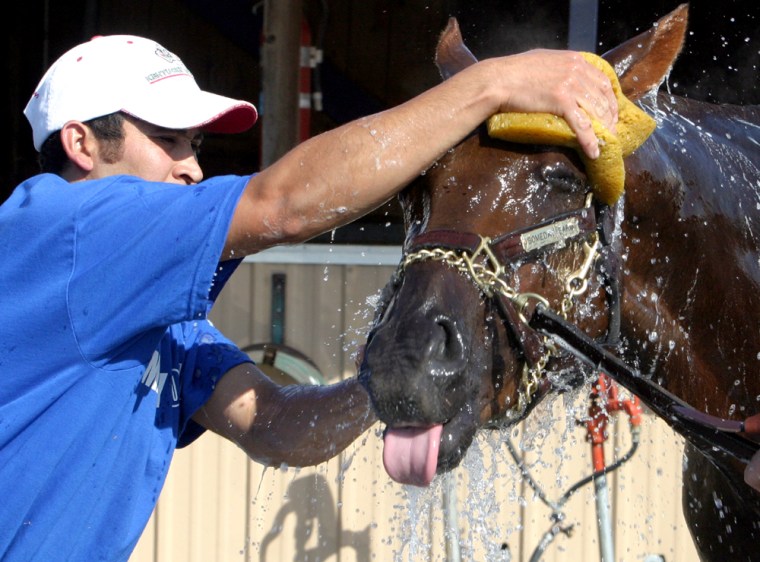Smarty Jones is an overwhelming favorite to win Saturday's Belmont Stakes and become history's 12th Triple Crown winner, but handicappers can raise a few legitimate questions about his supposed invulnerability.
Will his stamina-deprived pedigree hurt him at the 1 1/2-mile distance of the Belmont? Will the presence of the speedster Purge force Smarty Jones into a destructive duel for the lead? Will Rock Hard Ten, who finished second in the Preakness in only his fourth career start, improve enough to reverse the result at Pimlico?
Yet these issues are minor compared to the factor that has governed previous attempts to win the sport's greatest prize. The key question Saturday is this: Will the gods of racing permit Smarty Jones to become a Triple Crown winner?
I am convinced that the gods protect the sanctity of the Triple Crown, preventing unexceptional horses from winning it, because there is no other way to explain the extraordinary history of the three events.
In theory, a good-but-not-great 3-year-old should be able to hit a streak of top form for five weeks in the spring and win three consecutive races -- particularly in a year when the competition is weak. In every other sport, unlikely individuals or teams get hot at the right time and win the greatest championships: last year Jim Furyk won the U. S. Open and the wild-card Florida Marlins captured the World Series.
Yet nothing of the sort has happened in the Triple Crown since the flowering of the American thoroughbred industry after World War II. From 1948 to the present, the only horses to sweep the series have been Citation (1948), Secretariat (1973), Seattle Slew (1977) and Affirmed (1978) -- four of the sport's all-time greats. Each of them was a 2-year-old champion who came into the 3-year-old classics seeking to verify his superstar status, and each of them went on to greater glory after the Triple Crown.
Plenty of less-than-great horses have tried to add their names to this list, including four in the last six years: Funny Cide, War Emblem, Charismatic and Real Quiet. Their credentials were all imperfect. (Funny Cide, for example, had never won a Grade I stakes before the Derby and Preakness -- and hasn't won one since.) Each was favored to win the Belmont; Real Quiet looked as if he couldn't lose when he turned into the stretch with a commanding lead. Yet each of them failed. The lesson is clear: The gods have decreed that a horse must be great in order to win the Triple Crown.
Of course, there are some conventional handicapping reasons to explain why the Belmont often thwarts horses who succeeded in Louisville and Baltimore. The 1 1/2-mile distance is a different game, and it has foiled horses with limited stamina or a one-dimensional front-running style -- such as War Emblem. The distance also plays against horses who have won the shorter Derby and Preakness by making one bold move on the turn -- horses such as Real Quiet and Charismatic. Horses with even-paced styles are more suited to the Belmont distance.
Having watched and admired the great champions of the 1970s, I felt ambivalent about the Triple Crown aspirants in recent years, because I knew they didn't deserve to have their names alongside Secretariat in the record books. If a horse such as War Emblem had succeeded, the Triple Crown would never again seem so special.
But I believe that Smarty Jones is worthy of a Triple Crown.
Unlike the Triple Crown winners since 1948, Smarty Jones didn't go into the classics as an acclaimed champion. However, that wasn't his fault. If he had been part of a prominent stable in New York or California, he might have been viewed as a budding superstar from the outset of his career. Because he was based at Philadelphia Park, he received little national attention, even though he won all three of his races by a combined total of 28 lengths and recorded one of the fastest speed figures of the year by a 2-year-old. He stayed out of the limelight winning early-season races for 3-year-olds against moderate competition in Arkansas. But after winning the Derby and Preakness, the latter by the biggest margin in the race's 128-year history, he has already put himself in the rarest of company. Only two colts before him have won the first two legs of the Triple Crown and come into the Belmont undefeated -- Majestic Prince and Seattle Slew. Smarty Jones' performances as a 3-year-old have been at least as good as Seattle Slew's. He has done more than enough for the racing gods to bless him.
Of course, he still has to deal with some practical matters, such as his suitability to the 1 1/2-mile distance. But he has already mocked the limitations of his pedigree by winning at 1 1/4 miles. He has proved that he is tractable enough to sit behind another speed horse and make his move when his jockey wishes. This controllable speed gives him the perfect style for the Belmont. And Smarty Jones doesn't have much meaningful competition. While Rock Hard Ten is likely to improve, he is unlikely to make up the 11 1/2 lengths by which he was beaten in the Preakness.
Smarty Jones figures to win Saturday and, if he does, no one ought to question whether he deserves to be on the illustrious list of Triple Crown winners. The only debate will be over where he ranks among the sport's elite.
